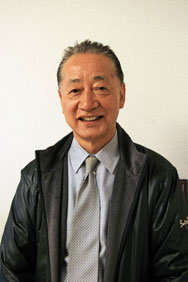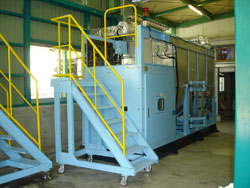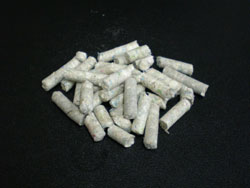Meet Japanese Companies with Quality
Fueling Japan by turning waste into energy Super Faiths
Website: Super Faiths Inc.![]()
Category: Japanese Machinery
Nothing wasted
Japanese culture is one of many virtues. Among its many definitive traits is the philosophy of mottainai ("nothing ought to be wasted"), wherein materials are valued and thus reused-an approach that finds much relevance in an era when resources are becoming increasingly rare and exhausted. While the world focuses on reducing the amount of wasted fuel and energy, Super Faiths Inc. is going a step beyond by converting waste into fuel and energy.

CEO Yukihiro Kimura

The SFD-2000, a 600-kilogram per day waste disposal machine
Building faith
Super Faiths is paving the way for change in the ecological technology industry. The green energy manufacturing company is becoming renowned internationally for the creation of its SFD conversion system: the world's first and only for recycling disposable diapers into pellet fuel.
The waste disposal machine developed by the company takes paper diapers sealed in plastic bags and proceeds to shred, dry and sterilize them, resulting in masses of paper fuel in fluff-like condition. The product, which is molded into pellet form, can be used as fuel for biomass boilers.
Why pellets?
The issue of garbage disposal continues to be a topic of concern among ecologists and environmentalists; Yukihiro Kimura, the CEO of Super Faiths, believes in converting disposable diapers into fuel rather than incinerating them. "Japan has a 'burning culture'," he explains. "While others might throw their garbage into landfills, in Japan, we dispose of ours through incineration and try to reuse as much material as possible."
Japan has turned to pellet fuel to get the job done, due to it being more cost-efficient and ecologically responsible than combustion through incineration. That paper fuel emits considerably less toxic gases and pollutants than wooden pellets has contributed to its favor worldwide as well.
Whereas the more conventional wood pellets contain between 3,000 to 3,500 kcal/kg of energy, paper diapers contain over 5,000. Because diapers don't use non-combustible materials, it's an excellent source of fuel, comprised of 60 percent pulp, 30 percent plastic, and 10 percent extremely absorbent polymer.
This method of recycling introduces a cost-efficient fuel source unlike any other, one that solves the disposal problem. Paper diaper pellets can provide heat to establishments located near the processing source, warming up spas and hot springs and clearing frozen roads of ice and slush.

Pellets of fuel created from disposable diapers
The history
"Many ask me where I came up with the idea to recycle disposable diapers. I just thought it would be interesting," Kimura says. "I went ahead with the idea, as I thought it had the potential to become a greener source of energy."
The company started as Space Planning 21 Inc., a planning company established in 1977, eventually specializing in the manufacture of environmental products from 2004. Having since garnered interest from all over Asia and Europe, Super Faiths aims to expand globally and is currently in talks with Slovenian medical facilities that may be importing their technology within the year.
"The environmental business is a new field, and its prominence is increasing worldwide," Kimura says. "We aspire to make this one of Japan's major industries."
Website: Super Faiths Inc.![]()



